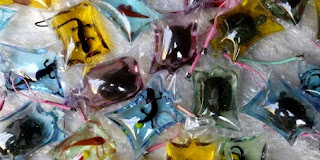Marine Pollution - Ocean Trash
An ocean full of life, or an ocean full of trash
The ocean remains as one of the largest, most mysterious and diverse places on Earth. Unfortunately, it is treated as a garbage dump and threatened by pollution from both man-made and natural causes.
The majority of ocean pollution is caused by the trash and litter in the ocean that not only paints a dirty view, but also has fatal effects on marine life.
Almost one million marine animals and sea birds are killed each year due to ocean pollution.
While some of this litter is dumped directly into the ocean on a daily basis, almost 80% of it makes its way into the waters from land-based sources via drains and sewers.
Oil from boats, airplanes, cars, and trucks or anything with a motor are also swimming their way into the ocean.
Chemical discharges from factories, storm-water, and raw sewage overflow from water treatment systems also play a part in poisoning the ocean.
Plastic Pollution
Plastic is versatile, lightweight, strong, and flexible. These attractive qualities have contributed to advances in healthcare and technology, and even helped millions of people suffering from poverty.
However, this is also the reason why the most common rubbish that enters our ocean is plastic, and that is where it will stay.
Plastic, unlike other trash, will not biodegrade, which means it will not be decomposed by other organisms or bacteria. At the current rate we are making and dumping plastic into the ocean, it is expected to outweigh all the fish in the sea by 2050.
So all the eight million metric tons of plastic that to dump into the sea instead of recycling, such as out grocery bags, water bottles, straws, and containers, will remain in the ocean and continue to pollute our beaches, entangle marine life like tortoises, sharks, and dolphins, and get ingested by fish and seabirds.
Impact on Marine Life
Fishes in the ocean can ingest up to almost 24,000 tons of plastic in just a single year. Ingesting plastic can cause intestinal injury which leads to death. This transfers the plastic up the food chain to larger fishes and marine mammals and can even be served on our plate.
Turtles living in the sea may mistake floating plastic for food and can choke and suffer internal injury, leading to death. Plastic littered around the beaches have also shown to affect their reproduction. Females are having difficulties digging a hole for their eggs on shore and many of the turtles that hatch are not able to make it to the waters alive.
Seabirds can also mistake plastic for food. Ingesting plastic reduces the storage volume of the stomach. Hundreds of thousands of seabirds that ingest plastic every year may starve to death thinking that they are full from eating plastic.
Marine mammals such as whales and seals can also ingest and entangle themselves up in the plastic trash floating around in the ocean. Many marine mammals have been found with plastic either entangled in their mouth or limiting their mobility. Large amounts of plastic have also been found in the habitat of endangered animals such as the Hawaiian monk seals.
Oil Pollution
The majority of oil that enters the ocean is a result of leaks during oil extraction, illegal tank cleaning operations at sea, and discharges into the rivers which then flow into the sea.
Waves and water currents can move the oil onto shore. When it reaches the shoreline, oil waste can cause contamination as well as erosion when it comes into contact and interacts with sediments such as beach sand, gravel, rocks, and vegetation.
Impact on Marine Life
Wildlife that thrive in the ocean including fish, mammals, birds, and amphibians, will all be affected and poisoned by oil waste.
Many seabirds can actually inject the oil when they try to clean themselves. The oil in their bodies will poison them, and also poison whoever eats the dead corpse.
Oil also renders fur-bearing mammals such as sea otters unable to insulate and destroys the water repellency of seabirds’ feathers. Without the ability to repel water or insulate from the cold waters, these animals suffering from harsh elements may die of hypothermia.
Fishes, when exposed to or come into contact with oil, may suffer damages to their reproductive systems and behaviours and experience changes in heart and respiration rates. They may also suffer from reduced growth, enlarged livers, and fin erosion. This can lead to a drastic effect which impacts the food chain if a species population changes or disappear.



Comments
Post a Comment